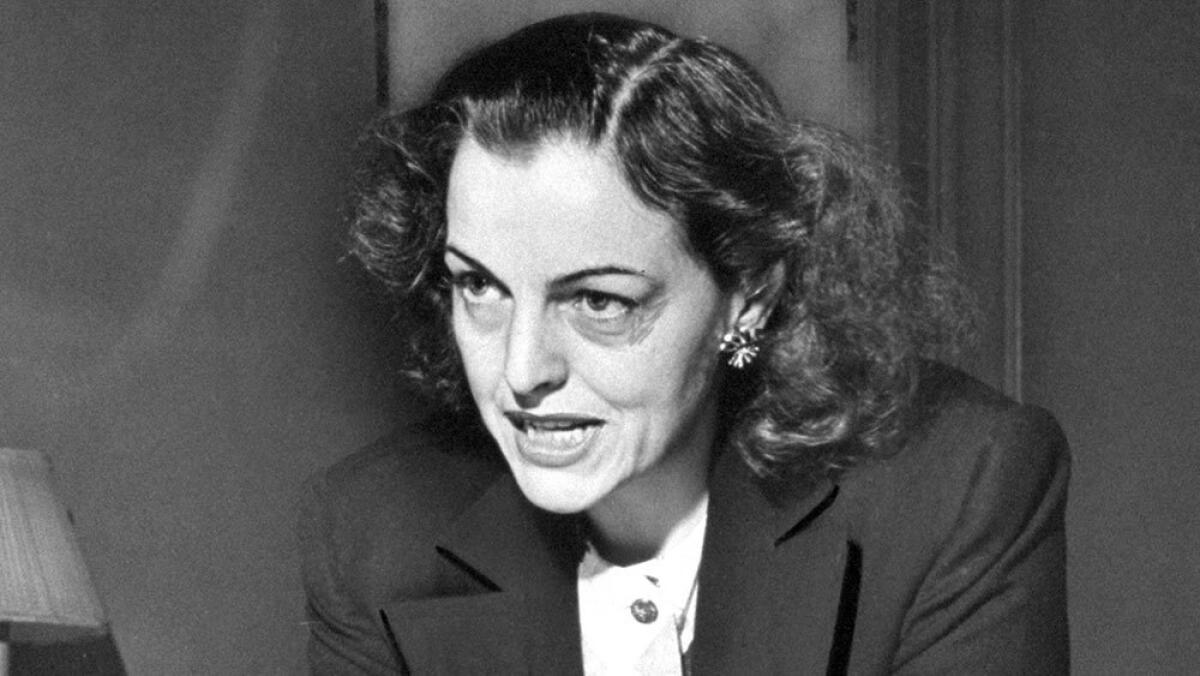From the Archives: Helen Gahagan Douglas, Ex-Congresswoman, Dies

Helen Gahagan Douglas, the actress-turned-congresswoman who lost the 1950 U.S. Senate race to Richard M. Nixon in one of the most vitriolic campaigns in the state’s history, died Saturday in a New York cancer hospital. She was 79.
The New Jersey-born Democrat was a stage star and operatic singer who moved to the California film community and eventually to California politics. She was a three-term congresswoman whose McCarthy-era votes against funding for the House Un-American Activities Committee and opposition to contempt citations for the “Hollywood Ten” prompted opponents — including Nixon — to label her “soft on communism.”
That charge, and the nickname “pink lady,” which clung to her throughout the campaign, were enough to give then-Congressman Nixon — fresh from the investigation that led to the January, 1950, perjury conviction of Alger Hiss — a 60% vote in his bitterly fought campaign against Mrs. Douglas. That race ended her political career.
During that campaign, Mrs. Douglas accused her opponent of conducting a campaign of “fear and hysteria.”
Nixon, she said, “is throwing up a smoke screen of smears, innuendos and half-truths to try to confuse and mislead . . . I despise totalitarianism in any form — fascism, Nazism or communism. I despise the cheap thinking that is being injected into this campaign in California and throughout the country.”
Mrs. Douglas had entered Memorial Sloan-Kettering Cancer Center a week ago, according to a family spokesman, for treatment of a recurrence of cancer. She had undergone a mastectomy seven years ago, a quarter-century after introducing a bill urging researchers to pool their efforts to combat cancer.
At her side when she died early Saturday morning were Oscar-winning actor Melvyn Douglas, her husband of 49 years, and her daughter, Mary Helen. Her son, Peter, had visited her the day before, the spokesman said.
Mrs. Douglas’ professional life crossed a spectrum of careers. Reared in Brooklyn, she was a Barnard College student in 1922 when she made her theater debut in “Dreams for Sale” and later appeared in such plays as “Trelawney of the Wells” and “Mary of Scotland” before taking voice lessons that eventually took her to the operatic stage.
She sang in three languages and on two continents, performing in “Aida” and “Tosca” in Vienna, Budapest and Prague before returning to the United States and a Hollywood Bowl engagement in the late 1930s.
While she was performing in “Tonight or Never” in 1930, she met Douglas, whom she married in 1931. Together they went to Hollywood to star in “She,” the 1935 film about the fantastic goddess-queen of the H. Rider Haggard novel.
Of the character, Mrs. Douglas said then, “She ruled her kingdom by terror and she herself was fear-ridden. Personally I’ve never been afraid of anything — at least I can’t think of anything right now.”
It was in California that Mrs. Douglas took up political cudgels, testifying in mid-1940 before the Assembly subcommittee about the housing problems of migrant workers during the Depression.
Within a few months, she was selected as a Democratic national committeewoman from California, working for the party ticket in the November elections against the GOP presidential candidate Wendell Willkie. Asked at the time if she had a message for the state’s Democrats, she said “Yes, — do not underestimate our opponents. They are working every street, alley and boulevard.” As early as that 1940 campaign, charges of “reputed leftist support” began to be leveled at Mrs. Douglas, whose newcomer status and social and economic beliefs caused concern and disgruntlement among some of Southern California’s Democratic women.
Appointed as a civil defense volunteer by President Franklin D. Roosevelt shortly before the attack on Pearl Harbor, Mrs. Douglas was chosen in 1944 as the Democratic nominee for Congress in Los Angeles’ 14th District amid “carpetbagging” charges. She did not live in the district, and although that was not then a condition of candidacy, one opponent called her “a political gypsy who is trying to push her tent into the 14th District.”
Mrs. Douglas won a close race, and by the time of her swearing-in in 1945, she and blond Connecticut Republican representative Clare Booth Luce were being called the “congressional glamour girls.”
Her appointment to the House Foreign Affairs Committee, where she served for three terms, put her in the spotlight on post-war international issues, although it was on domestic matters that Mrs. Douglas encountered her most vehement criticism.
She was one of only 17 representatives who voted against contempt citations for the “Hollywood Ten,” writers and entertainers who, to her “personal regret,” refused to answer questions about their alleged Communist Party membership before the House Un-American Activities Committee.
In 1950, when Sen. Sheridan Downey retired, Mrs. Douglas decided to run for the Senate. It was a campaign in which her voting record — including opposition to a $150,000 appropriation for HUAC and to subversive activities control bill requiring registration of Communists — was used as evidence of her alleged leftist sympathies.
But Mrs. Douglas declared herself opposed to Communist aggression abroad, saying, “The Cold War launched by Communist imperialists has been a costly, nerve-racking and distasteful affair.”
Difficulties dogged her Senate campaign, in which her opponents dubbed her “the pink lady.” A group of USC students, in what was later described as a fraternity initiation prank, sprayed her with seltzer water and threw hay at her as she spoke on campus.
One reporter, present when Mrs. Douglas was speaking at an Orange County rally, said the candidate left the podium in tears after hecklers disrupted the meeting, booing her speech and distributing leaflets hinting as her alleged communistic leanings. The leaflets were printed on pink paper.
Nixon’s Southern California campaign manager, Bernard Brennan, said late in 1950 that Mrs. Douglas’ record “discloses the truth about her soft attitude toward communism.”
Although she was supported in her bid by many Eastern Democrats, Mrs. Douglas encountered divisiveness among Democrats in her own state. When she lost the 1950 election to Nixon, she declared later, “To me, politics is not a career, but a service. By being defeated, I did not give up my rights as an American citizen.”
The bitter scars left by the 1950 campaign did not fade. As many as 10 years later, she had eggs thrown at her in Boston during a speech on foreign policy.
But more than two decades later, there was a measure of satisfaction.
During Nixon’s dark Watergate days, bumper stickers proclaimed: “Don’t Blame Me — I Voted for Helen Gahagan Douglas.”
After the 1950 loss, she returned briefly to the stage, acting with the late Basil Rathbone, giving concerts and poetry readings and working on her memoirs.
Family spokesmen said there will be an autopsy, for the benefit of cancer research, before her body is cremated. Memorial service plans are incomplete.
More to Read
Start your day right
Sign up for Essential California for the L.A. Times biggest news, features and recommendations in your inbox six days a week.
You may occasionally receive promotional content from the Los Angeles Times.







